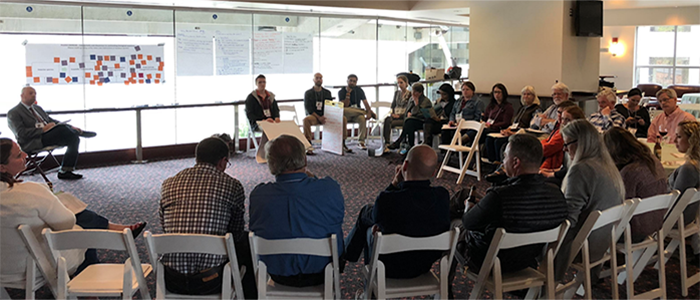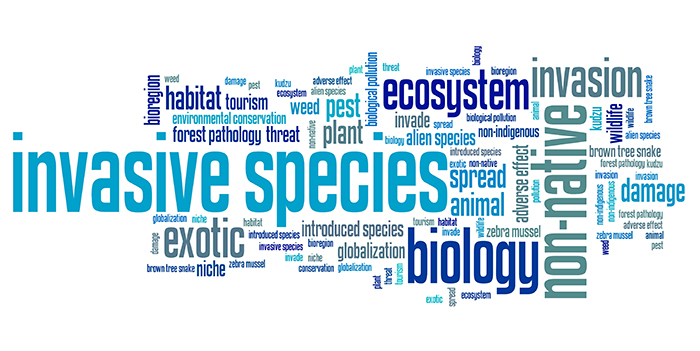[vc_row][vc_column][vc_column_text]
February 18, 2019
Cover image: Land managers, scientists, educators, and policymakers attended the Biological Invasions: Confronting a Crisis workshop at Virginia Tech in April 2018.
Biological invasions by non-native organisms are one of the most important aspects of rapid global change, costing the global economy greater than $1 trillion annually. Globally, biological invasions also decimate local flora and fauna, contribute to disease outbreaks and agricultural loss, and threaten human health.
In April 2018, Virginia Tech researchers held a two-day workshop, titled Biological Invasions: Confronting a Crisis, that was supported by the Global Systems Science Destination Area. The conference was attended by land managers, scientists, educators, and policymakers.
Findings from this workshop on how to build partnerships and bridge science and policy to address the biological invasions crisis were published recently by the Virginia Tech researchers in the journal Invasive Plant Science and Management.
“Biological invasions are one of the grand socio-environmental challenges facing the globe as exotic species threaten biodiversity, food security, and human health. Addressing such a complex crisis requires engagement from the diverse stakeholders that are impacted,” said Jacob Barney, first author on the paper and associate professor of invasive plant ecology in the School of Plant and Environmental Sciences.
The authors of the paper and organizers of the workshop were a subgroup of faculty members from the Global Change Center at Virginia Tech, an arm of the Fralin Life Science Institute. They include Jacob Barney and David Haak of the School of Plant and Environmental Sciences in the College of Agriculture and Life Sciences; Todd Schenk of the School of Public and International Affairs in the College of Architecture and Urban Studies; Scott Salom of the Department of Entomology in the College of Agriculture and Life Sciences; and Bryan Brown and Erin Hotchkiss of the Department of Biological Sciences in the College of Science.
“We are so pleased to see the incredible and rapid progress made by this diverse interdisciplinary team. They epitomize the Global Change Center’s mission of bringing together expertise from all corners of campus to tackle some of the most pressing issues facing the environment and society,” said William Hopkins, the Center’s director and professor of wildlife in the College of Natural Resources and Environment. “Since their recent inception, they have already offered multiple new team-taught courses, built a strong network of external collaborators, held this high-profile spring workshop, and developed multiple manuscripts. Because of their hard work, Virginia Tech is well positioned to be a global leader on invasive species issues.”
The diversity of invasive species ranges from viruses to plants to crayfish to hippos. The Millennium Ecosystem Assessment projected that the rate and impact of biological invasions will increase with global trade, climate change, and the rise in economic prosperity.
Additionally, invasive species are associated with disrupting ecosystem processes, reducing food production, and threatening human health. The recent Ebola and Zika epidemics highlight the devastating impacts of biological invasions, as well as how such invasions can be mitigated with strategic and coordinated action.
Examples of invasive species threatening Virginia include a sap-sucking invasive insect called the hemlock woolly adelgid, which has decimated the hemlock tree population, and the spotted lanternfly, which attacks grapes, peaches, hops, and many tree species.
The researchers’ goal for the workshop was to bring together representatives of diverse stakeholder groups in the Commonwealth of Virginia to create connections, foster collaboration, and facilitate a solutions-focused discussion about the pressing invasive species challenges. The scale at which invasive species impact society and the environment range from local to international and involve many stakeholders and policies across that continuum.
“Our goal was to create an environment to foster communication across these domains to identify the successes and roadblocks to addressing this problem. The workshop was designed to engage the 62 participants representing academic researchers, Extension and education, nongovernmental organizations, agencies from the local to the state level, land managers, and citizens in a variety of activities to engage each other. Simply getting these folks together in a room to discuss their shared struggles and successes was a major step and is, unfortunately, a rare occurrence.” said Barney.
The diversity of workshop participants reflected the broad reach of invasive species. The workshop format was designed to facilitate dialogue across the research, management, and policy perspective and was not focused on a single invasive species or ecosystem.
“While invasive species may at first appear to be an issue exclusively for the biological sciences, it quickly becomes apparent that the human dimension is integral. Land managers and other stakeholders make decisions that, we hope, are informed by science, but also reflect their respective interests and priorities and the complex social and political realities they find themselves in. Advancing better policy and management to address invasive species requires that we take those political and social factors into account,” said Todd Schenk co-author of the paper and assistant professor of Urban Affairs and Planning in the School of Public and International Affairs.
Two guests recognized across the United States in the biological invasions field — Heather Reynolds, associate professor of biology at Indiana University, and Jamie Reaser, executive director of the United States National Invasive Species Council — gave keynote talks to highlight the impact of the biological invasions crisis. Workshop participants also took part in active-engagement sessions and community reporting to identify communication and coordination gaps.
“To me, one of the most striking outcomes of the workshop was hearing different stakeholders’ opinions on how to make progress. As academics at a university, our focus is predictably on research involving invasive species, and obviously that research is important and will continue to be important for addressing invasive species issues. However, a prevailing theme from the workshop was that the major things we need to do to make progress involve communication and collaboration. Hearing those perspectives from nonacademic stakeholders was pretty eye-opening,” said Bryan Brown, co-author on the paper and associate professor of aquatic ecology in the Department of Biological Sciences.
Continuing to confront the invasive species crisis will require a concerted effort. Strategic and coordinated action by different groups requires collaboration beyond traditional biological and technological boundaries. Although the workshop was limited in membership to one U.S. state, it can provide a model on which future efforts can be built.
“The workshop was an exciting first step,” said Schenk. “Moving forward, we seek to engage more people from groups underrepresented at this first workshop to facilitate broader conversations on effective management in practice when interests and priorities are not aligned, further research the interactions between the biology and human dimensions of invasives, and play a central role in what is an emerging coalition seeking to advance impactful changes in this space in Virginia and beyond.”
Virginia Tech researchers are continuing to identify collaborative spaces to increase communication among stakeholders and broaden the capacity to confront the biological invasions crisis.
“Immediately, we have plans to expand the horizons of current graduate students through an immersive experience in science, policy, and advocacy over spring break in Washington, D.C. In addition, we are planning an Invasive Species summit in Richmond, Virginia for late spring. The goals of this summit are to broaden our communication platform to include voices that were notably missing from the workshop and to provide catalytic activities for forging new collaborations,” said David Haak co-author of the paper and assistant professor of plant and microbial genomics in the School of Plant and Environmental Sciences.
[hr_shadow]
CONTACT:
Kristin Rose
(540) 231-6614
[hr]
[/vc_column_text][/vc_column][/vc_row]


